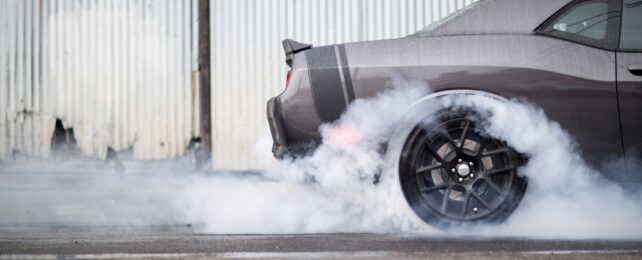Most of us have experienced the sudden, deafening blare of a car's modified muffler, shattering your tranquility into a million pieces as it speeds past.
If you live in a neighborhood where these disruptive sounds are familiar, it probably won't surprise you that research links a desire to own this type of car to higher levels of sadism and psychopathy.
Psychologist Julie Aitken Schermer of the University of Western Ontario in Canada analyzed over 500 people to investigate the relationship between 'dark' personality traits and a preference for loud cars with modified mufflers.
"As these exhaust modifications are both a disturbance to people and animals and are illegal in some jurisdictions… understanding who wants their vehicle to be loud is an interesting research question," Schermer wrote in Psychology Today about her pilot study.
Schermer surveyed 529 business students who had an average age of 18 years, 52 percent of whom were men. The 'car scale' asked three questions about participants' feelings towards loud cars, identification with their own cars, and the potential to modify their mufflers, with higher scores indicating a preference for loud cars.
They also completed the Short Dark Tetrad, a 28-item scale measuring the personality traits of Machiavellianism, narcissism, psychopathy, and sadism. These traits are referred to as dark because of their 'evil' characteristics, which include selfishness and taking advantage of others, usually without empathy.
Schermer told Colin Butler of CBC News that she was inspired to study the minds of loud car enthusiasts while walking her dog near the university campus, where she frequently encountered this unsettling form of noise pollution.
Schermer assumed that people might like their cars louder to get more attention, which aligns with narcissistic behavior. She also expected that people with sadistic or psychopathic traits – associated with criminal attitudes – would be more inclined to desire loud cars with often illegal modifications.
And she predicted that younger men would score higher on the preference for loud cars, as this group is associated with enjoying louder leisure activities.
"We found that it was sadism and psychopathy predicting who wants to modify their mufflers, who feels more connected to their vehicle, and [who thinks] loud cars are really cool," Schermer told CBC News.
"It seems to be this callous disregard for other people's feelings and their reactions. That's the psychopathy coming out and it's also they probably get a kick out of enjoying watching people get startled."
Being a man and having sadistic and psychopathic personality traits accounted for about 29 percent of the variance in the preference for loud vehicles. The analysis did find that being younger predicted a higher car scale score within the group, but this correlation was not significant enough to draw conclusions.
Associations were found between higher scores on the car scale and each of the dark tetrad traits, though not significantly in the case of Machiavellianism and narcissism. If the survey had asked about wanting others to notice their loud car, Schermer suggests narcissism might have been a better predictor.
While the study gives some insights, there are caveats, of course. The participants in the relatively small sample were relatively young, and all enrolled in a business degree at the same university, so Schermer's findings may not apply to broader populations.
The survey only asked about the desire to own loud cars, not actually owning one, and didn't explore preferences for other loud vehicles, like motorcycles or big trucks. Future research could examine other variables, such as listening to loud music while driving and where people would drive their loud vehicles.
"Other than legally enforcing laws with respect to these automobile modifications, the present results suggest that other tactics, such as information campaigns, may not be useful," Schermer concludes in her report.
"It is unlikely that those scoring higher on psychopathy and sadism would be swayed by the fact that the modified mufflers may be damaging to others."
The research has been published in Current Issues in Personality Psychology.
